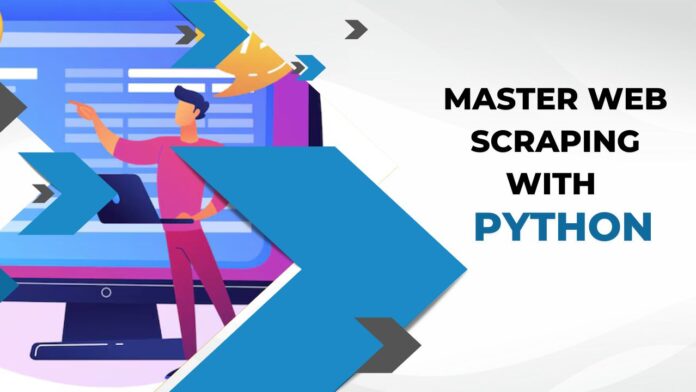Data extraction from websites through web scraping has become an important technique nowadays. Businesses depend on gathering market intelligence and conducting in-depth research, which makes them stay competitive. When it comes to web scraping, one selects the language, given the strong ecosystem it flaunts. Among the various libraries and frameworks, Beautiful Soup and Scrapy are significant elements in making this process simpler, with a wide range of capabilities in terms of working with small and larger projects.
For companies intending to utilize the complete power of web scraping, a collaboration with a Python Development Company India like Tuvoc Technologies ensures qualified developers, solution sets tailored to your needs, and scalable architectures.
What is Web Scraping?
Web scraping is the process of extracting data from websites in an automated manner. In contrast to copying information manually, web scraping uses software tools for navigation through web pages and extracting relevant data in order to store it in structured formats like CSV, JSON, or databases.
Key Uses of Web Scraping:
- Market Research: Collecting competitor prices, customer reviews, and product data for analysis.
- Content Aggregation: Building platforms like price comparison websites or news aggregators.
- Lead Generation: Pulling contact information from directories or business websites.
- Trend Analysis: Monitoring social media, forums, or blogs for emerging trends.
Web scraping gives a business the most valuable insight into what they should do next. For building customized and effective scraping solutions, collaborating with a Python Web Development Company in India will ensure access to the latest technologies and best practices.
Why Python is Best for Web Scraping?
The reason why Python dominates in web scraping is simply because of its simplicity and the vast libraries available. Here’s why Python is an ideal language for web scraping:
- Ease of Use: Python’s syntax is straightforward, enabling quick development of web scrapers.
- Diverse Libraries: From Beautiful Soup to Scrapy, Python offers tools for every level of scraping complexity.
- Flexibility: Python integrates seamlessly with APIs, databases, and data analytics tools.
If you want professional-grade scraping tools, hiring Python developers in India who specialize in web scraping is wise.
Tools and Techniques of Web Scraping
Python provides several tools for web scraping, each tailored to the scenario of the complexity in question. Here are the most popular ones:
1. Beautiful Soup:
Beautiful Soup is a Python library meant for parsing HTML and XML documents. It is ideal for a junior level since it can easily extract specific data from smaller websites.
Some of its main features include:
- The effective parsing of HTML and XML documents.
- Easy extraction of tags, attributes, and text.
- Graceful handling of poorly structured HTML.
Example Code:
from bs4 import BeautifulSoup
import requests
url = “https://example.com”
response = requests.get(url)
soup = BeautifulSoup(response.content, ‘html.parser’)
# Extract all links
links = soup.find_all(‘a’)
for link in links:
print(link.get(‘href’))
This approach is ideal for businesses starting their data extraction journey. Hiring a Python Web Development Company in India ensures these tools are implemented effectively for business use cases.
2. Scrapy:
Scrapy is a high-performance and scalable web scraping framework that is best suited for large-scale projects. It provides built-in mechanisms for handling complicated scraping requirements like pagination and asynchronous requests.
Key Features:
- Supports asynchronous scraping for high-speed data extraction.
- Built-in tools for exporting data to formats like JSON, CSV, or XML
- Custom middleware options for complicated website interactions.
Example Code:
import scrapy
class QuotesSpider(scrapy.Spider):
name = “quotes”
start_urls = [‘http://quotes.toscrape.com’]
def parse(self, response):
for quote in response.css(‘div.quote’):
yield {
‘text’: quote.css(‘span.text::text’).get(),
‘author’: quote.css(‘span small.author::text’).get(),
}
For businesses with extensive data scraping needs, collaborating with a Python Development Company India ensures optimal performance and scalability.
3. Selenium:
Selenium is a savior when JavaScript-heavy sites are concerned as it allows developers to simulate actions on the browser side, thus being able to scrape content generated dynamically.
Key Features:
- Automates the interaction with the browser for JavaScript-heavy websites.
- Scrapes data that is unavailable to regular scrapers.
- Due to its hybrid capabilities, Selenium supports a wide range of frameworks like Scrapy.
Example Use Case: Live stock market data scraping from dynamic dashboards.
To achieve maximum performance, it would be best to hire Python developers in India who are well-experienced in Selenium.
Advanced Scraping Techniques
1. CAPTCHAs and Proxies
Many websites use CAPTCHAs and IP-blocking techniques to thwart scraping. These can be countered with:
- CAPTCHA-solving APIs.
- Proxy rotation services to avoid detection.
2. APIs vs. Scraping
If the website gives out an API, a developer would always prefer to call the APIs rather than scraping. APIs tend to be more consistent and do not attract blockages.
3. Data Storage
Scraped data can be saved in databases like MySQL or MongoDB for further processing and analysis.
Ethical Considerations:
Though powerful, web scraping comes with responsibilities. Businesses should ensure that its use complies with the website’s terms of service, limit requests to not overwhelm a server, and only use it for legitimate purposes.
Challenges in Web Scraping
Web scraping is not without challenges. Common issues include:
- Dynamic Content: In cases where JavaScript-rendered content is hard to scrape.
- Rate Limiting: Websites usually block or limit IPs that send too many requests.
- Data Structure Changes: Websites change their structure regularly, which breaks existing scrapers.
Conclusion:
Web scraping is a tool that businesses can use to gain access to data so as to come up with strategic decisions. Tools such as Beautiful Soup, Scrapy, and Selenium enable organizations to access, analyze, and use data. The process does demand expertise and proper caution with respect to ethical considerations.
With a reliable Python Development Company India, such as Tuvoc Technologies, you get access to dedicated developers, cutting-edge technologies, and tailor-made solutions.
Ready to ace web scraping? Hire dedicated Python developers in India from Tuvoc Technologies and take your data-driven strategies to the next level.



